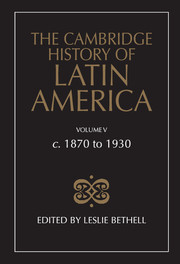Book contents
- Frontmatter
- PART ONE MEXICO
- PART TWO CENTRAL AMERICA AND THE CARIBBEAN
- PART THREE THE RIVER PLATE REPUBLICS
- PART FOUR THE ANDEAN REPUBLICSo
- 15 Chile from the War of the Pacific to the world depression, 1880–1930
- 16 Bolivia from the War of the Pacific to the Chaco War, 1880–1932
- 17 The origins of modern Peru, 1880–1930
- 18 Colombia, Ecuador and Venezuela, c. 1880–1930
- PART FIVE BRAZIL
- Bibliographical essays
- References
18 - Colombia, Ecuador and Venezuela, c. 1880–1930
from PART FOUR - THE ANDEAN REPUBLICSo
Published online by Cambridge University Press: 28 March 2008
- Frontmatter
- PART ONE MEXICO
- PART TWO CENTRAL AMERICA AND THE CARIBBEAN
- PART THREE THE RIVER PLATE REPUBLICS
- PART FOUR THE ANDEAN REPUBLICSo
- 15 Chile from the War of the Pacific to the world depression, 1880–1930
- 16 Bolivia from the War of the Pacific to the Chaco War, 1880–1932
- 17 The origins of modern Peru, 1880–1930
- 18 Colombia, Ecuador and Venezuela, c. 1880–1930
- PART FIVE BRAZIL
- Bibliographical essays
- References
Summary
The articulate inhabitants of the Republics of Colombia, Ecuador and Venezuela in the half century from 1880 to 1930 – their second half-century of independent existence – usually expressed themselves rather more cautiously on the subject of progress than their contemporaries in more fortunate parts of the world: ‘In the political life of all peoples progress is slow’, wrote the leaders of the dissident wing of Colombian conservatism in 1896, ‘as with the tides – to follow the thought of a well-known English writer [Arthur Hugh Clough] – the waves alternately advance and fall back, but the land conquered is always greater than the land lost; there is a constant advance.’ To another Colombian conservative, Miguel Antonio Caro, the advance was never clear to the participants: ‘The progress of ideas is mysteriously mixed into human history. The conflict of principles is interwoven with the struggles of parties, and fighting in one band or another, through individual or collective interest, men serve or oppose the cause of civilization, frequently without any aim or consciousness of doing so.’
Armed conflict in this part of the world, endemic in the nineteenth century, persisted into the early years of the twentieth century. The Colombian ‘War of the Thousand Days’ ended in 1902 with the treaties of Neerlandia and Wisconsin, in which the liberal Generals Rafael Uribe Uribe and Benjamin Herrera respectively admitted defeat in a future banana-growing centre and on board a US warship. Sporadic uprisings in Venezuela persisted for some years after the defeat of the last major armed revolt, the Revolución Libertadora of 1903.
- Type
- Chapter
- Information
- The Cambridge History of Latin America , pp. 641 - 682Publisher: Cambridge University PressPrint publication year: 1986

